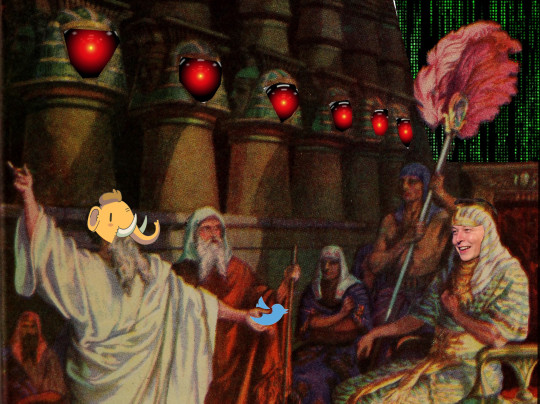#right to exit
Text
Two principles to protect internet users from decaying platforms

Today (May 10), I’m in VANCOUVER for a keynote at the Open Source Summit and later a book event for Red Team Blues at Heritage Hall; on Thurs (May 11), I’m in CALGARY for Wordfest.
Internet platforms have reached end-stage enshittification, where they claw back the goodies they once used to lure in end-users and business customers, trying to walk a tightrope in which there’s just enough value left to keep you locked in, but no more. It’s ugly out there.
If you’d like an essay-formatted version of this post to read or share, here’s a link to it on pluralistic.net, my surveillance-free, ad-free, tracker-free blog:
https://pluralistic.net/2023/05/10/soft-landings/#e2e-r2e
When the platforms took off — using a mix of predatory pricing, catch-and-kill acquisitions and anti-competitive mergers — they seemed unstoppable. Mark Zuckerberg became the unelected social media czar-for-life for billions of users. Youtube was viewed as the final stage of online video. Twitter seemed a bedrock of public discussion and an essential source for journalists.
During that era, the primary focus for reformers, regulators and politicians was on improving these giant platforms — demanding that they spend hundreds of millions on algorithmic filters, or billions on moderators. Implicit in these ideas was that the platforms would be an eternal fact of life, and the most important thing was to tame them and make them as benign as possible.
That’s still a laudable goal. We need better platforms, though filters don’t work, and human moderation has severe scaling limits and poses significant labor issues. But as the platforms hungrily devour their seed corn, shrinking and curdling, it’s time to turn our focus to helping users leave platforms with a minimum of pain. That is, it’s time to start thinking about how to make platforms fail well, as well as making them work well.
This week, I published a article setting out two proposals for better platform failure on EFF’s Deeplinks blog: “As Platforms Decay, Let’s Put Users First”:
https://www.eff.org/deeplinks/2023/04/platforms-decay-lets-put-users-first
The first of these proposals is end-to-end. This is the internet’s founding principle: service providers should strive to deliver data from willing senders to willing receivers as efficiently and reliably as possible. This is the principle that separates the internet from earlier systems, like cable TV or the telephone system, where the service owners decided what information users received and under what circumstances.
The end-to-end principle is a bedrock of internet design, the key principle behind Net Neutrality and (of course) end-to-end-encryption. But when it comes to platforms, end-to-end is nowhere in sight. The fact that you follow someone on social media does not guarantee that you’ll see their updates. The fact that you searched for a specific product or merchant doesn’t guarantee that platforms like Ebay or Amazon or Google will show you the best match for your query. The fact that you hoisted someone’s email out of your spam folder doesn’t guarantee that you will see the next message they send you.
An end-to-end rule would create an obligation on platforms to put the communications of willing senders and willing receivers ahead of the money they can make by selling “advertising” in search priority, or charging media companies and performers to “boost” their posts to reach their own subscribers. It would address the real political speech issues of spamfiltering the solicited messages we asked our elected reps to send us. In other words, it would take the most anti-user platform policies off the table, even as the tech giants jettison the last pretense that platforms serve their users, rather than their owners:
https://pluralistic.net/2022/12/10/e2e/#the-censors-pen
The second proposal is for a right-to-exit: an obligation on tech companies to facilitate users’ departure from their platforms. For social media, that would mean adopting Mastodon-style standards for exporting your follower/followee list and importing it to a rival service when you want to go. This solves the collective action problem that shackles users to a service — you and your friends all hate the service, but you like each other, and you can’t agree on where to go or when to leave, so you all stay:
https://pluralistic.net/2022/12/19/better-failure/#let-my-tweeters-go
For audiences and creators who are locked to bad platforms with DRM — the encryption scheme that makes it impossible for you to break up with Amazon or other giants without throwing away your media — right to exit would oblige platforms to help rightsholders and audiences communicate with one another, so creators would be able to verify who their customers are, and give them download codes for other services.
Both these proposals have two specific virtues: they are easy to administer, and they are cheap to implement.
Take end-to-end: it’s easy to verify whether a platform reliably delivers messages from to all your followers. It’s easy to verify whether Amazon or Google search puts an exact match for your query at the top of the search results. Unlike complex, ambitious rules like “prevent online harassment,” end-to-end has an easy, bright-line test. An “end harassment” rule would be great, but pulling it off requires a crisp definition of “harassment.” It requires a finding of whether a given user’s conduct meets that definition. It requires a determination as to whether the platform did all it reasonably could to prevent harassment. These fact-intensive questions can take months or years to resolve.
Same goes for right-to-exit. It’s easy to determine whether a platform will make it easy for you to leave. You don’t need to convince a regulator to depose the platform’s engineers to find out whether they’ve configured their servers to make this work, you can just see for yourself. If a platform claims it has given you the data you need to hop to a rival and you dispute it, a regulator doesn’t have to verify your claims — they can just tell the platform to resend the data.
Administratibility is important, but so is cost of compliance. Many of the rules proposed for making platforms better are incredibly expensive to implement. For example, the EU’s rule requiring mandatory copyright filters for user-generated content has a pricetag starting in the hundreds of millions — small wonder that Google and Facebook supported this proposal. They know no one else can afford to comply with a rule like this, and buying their way to permanent dominance, without the threat of being disrupted by new offerings, is a sweet deal.
But complying with an end-to-end rule requires less engineering than breaking end-to-end. Services start by reliably delivering messages between willing senders and receivers, then they do extra engineering work to selectively break this, in order to extract payments from platform users. For small platform operators — say, volunteers or co-ops running Mastodon servers — this rule requires no additional expenditures.
Likewise for complying with right-to-exit; this is already present in open federated media protocols. A requirement for platforms to add right-to-exit is a requirement to implement an open standard, one that already has reference code and documentation. It’s not free by any means — scaling up reference implementations to the scale of large platforms is a big engineering challenge — but it’s a progressive tax, with the largest platforms bearing the largest costs.
Both of these proposals put control where it belongs: with users, not platform operators. They impose discipline on Big Tech by forcing them to compete in a market where users can easily slip from one service to the next, eluding attempts to lock them in and enshittify them.


Catch me on tour with Red Team Blues in Vancouver, Calgary, Toronto, DC, Gaithersburg, Oxford, Hay, Manchester, Nottingham, London, and Berlin!


[Image ID: A giant robot hand holding a monkey-wrench. A tiny, distressed human figure is attempting - unsuccessfully - to grab the wrench away.]

Image:
EFF
https://www.eff.org/files/banner_library/competition_robot.png
CC BY 3.0
https://creativecommons.org/licenses/by/3.0/us/
91 notes
·
View notes
Text
i love when wilson pops into an episode only to psychoanalyze house to the point of endangering both of them and then fucks off.
#look cute and read boyfriend to rubble and make a swift stage right exit#james wilson#hilson#house md#house md rewatch#job well done
2K notes
·
View notes
Text
Feel free to reblog and talk in the tags about the first time you played!
#technically i played in late 2015#but i just loaded it and then exited right back out#didn't play for another year after that#undertale#deltarune
3K notes
·
View notes
Text





European Elections - Exit polls show gains for the far right in Germany, France, the Netherlands, Austria, and Italy.
#i wanto to fucking break something#eu politics#eu elections#headlines#far-right#fascism#germany#france#the netherlands#austria#italy#news#italy tag#exit polls
737 notes
·
View notes
Text

Sneaking out of the office early on a Friday like…
Deep-sea giant isopods use their 14 legs to tiptoe along the seafloor. When the need to move a little more quickly arises, they fan out their uropod and pleopods (their tail and swimming limbs) and paddle away. Either way, they’re getting a jumpstart on the weekend.
#monterey bay aquarium#if i walk very slowly they wont notice#im about to roly poly right outta here#taking my exoskeleton to the exit
2K notes
·
View notes
Text

i finished it, was kicked out of the game, and then spent the next 10 minutes drawing this. i will now go take a shower, most likely cry, and then go through the emotional turmoil of convincing myself to reset so i can do a geno run. i hate it here :D
#undertale yellow#uty#my art#<- ifg#spoilers under these tags beware. although it is mostly just me being very very sad#that entire thing was heart wrenching. anyways#CEROBAS FIGHT??? HELLO???#i had to exit out of it the first time (i got to the last phase) to get better items but i came back and won pretty quickly#but THE CUTSCENES?!?!?#JFC NO WONDER THIS WOMANS SO MESSED UP. HER HUSBAND PRACTICALLY DIED IN HER ARMS AND THE LAST THING HE LEFT HER WITH- HIS DYING WISH- COULD#ONLY BE FULFILLED BY PUTTING THEIR ONLY CHILD IN DEATHS WAY. AND THEN WHEN SHE TOOK THAT RISK THE WORST THING HAPPENED AND SHE NOW HAS TO#LIVE WITH THE GUILT OF BEING THE ONE TO. MOST LIKELY. KILL HER ONE AND ONLY DAUGHTER#ALL THE WHILE SHE WAS PUSHING AWAY HER CHILDHOOD BEST FRIEND AND CONVINCING HERSELF THAT SHE WAS IN THE RIGHT TO SACRIFICE CLOVER WHO HAD#BEEN ONLY KIND MERCIFUL AND JUST THIS WHOLE TIME. EVEN TO THOSE WHO WERE TRYING TO KILL THEM. FUCK.#AAND WHEN CLOVER HUGGED HER I DOUBLED OVER IRL BC *THATS EXACTLY WHAT I WANTED TO DO IN THAT MOMENT* I HATE IT (read: love it) HERE#n dont even get me STARTED on after that. when clover started moving on their own and the gd white screen came up and we got flashbacks of#everyone's words. thats when the tears rlly started coming bc it clicked for me. 'oh. this is it. isn't it?' and IT WAS#WHEN THEY GAVE THEIR FUCKIGN HAT AND GUN AWAY TO MARTLET AND STARLO WELL THATS WHEN I REALLY STARTED CRYING#AAND THE GROUP HUGG#I WAS SOBBING WHENEVER I HAD TO WATCH THEM CRAWL UP AGAINST THE WALL AND DIE AND HAVE FLOWEYS WORDS PLAY OVERHEAD#AND THE FUCKOGN#THE F U C K I N G#AFTEWRCREDITS SCENE WHERE WE GOT THE 'You heard someone calling for help. You answered.' I GOT CHILLS SO BAD#to think that all the other souls have stories just as expansive and emotional as clover n frisks. how fucked up is that. in a good way tho#and finally the last scene where we got all 4 of our main friends sending us off in waterfall and we see clovers items end up in the dump#just waiting to be found by bratty and catty. fucken hell man this was a masterpiece#anyways time to reset and obliterate everyone and never emotionally recover from that ever!! really is feeling like 2016-17 again w the way#this game has me sobbing my eyes out and feeling the guilt of knowing that i dont HAVE to kill them all but im too curious not to#oh well. at least i have the balls to do it this time around instead of letting a youtuber do it for me ig
717 notes
·
View notes
Text
being a woman in Supernatural world is so fucking horrifying. don't wear white, you will get fridged. don't be blonde, you will get fridged. Jessica Moore was forcibly stenciled into Mary Winchester's shape to turn the narrative engine of righteous violence. she's the inciting incident for the entire epic and we know literally nothing about her. bc why would we need to. the wife is the sister is the daughter is the mother and they're all dead, and they're all used as instruments to give men an excuse to cry. you can love a man and take him into your home for a year but you'll still never get close enough to touch him bc he's keeping you in a pristine little box of unsullied domesticity. he's keeping you SAFE and CLEAN. he's making arrangements for you. and when the narrative machine beckons he will set you gently back down and return to his real and important work. don't be a virgin, virgins get fridged. don't be a hellbitch, here comes the fridge. do NOT put on that white nightgown, that is the uniform of the fridge, but it's too late, you're already bleeding out on the ceiling, maybe you always have been.
#supernatural#spn#lisa braeden#jessica moore#mary winchester#ruby supernatural#jo harvelle#that post that's like. doomed by the narrative bc the writer is a misogynist. literally#sam and dean's occasional convictions that they cant get close to women bc their lives are too Dark and Serious & theyll put them in Danger#would be neurotic and self centered except they are literally right. they ARE cursed.#ellen's conviction that jo will die young if she hunts and dean's condescension towards her. would be misogynistic.#but theyre right. jo will get fridged. she's blonde. it is literally a plot point in no exit that the ghost wants to get her more bc shes#blonde#like. they live in misogyny world.
293 notes
·
View notes
Text
Husk: When I said "bring me back something from the beach", I meant like a seashell.
Angel: *struggling to hold a seagull with all six arms* Well, you didn't fucking say that!
#epilogue#Angel: *motioning frantically to Charlie as Vaggie approaches*#“they didn’t mean a seagull!’’#Charlie: *currently fighting with her own seagull* oh shit#*seagull is quickly defenestrated*#that is the weirdest sentence I’ve ever written and yet I want it on a shirt#same energy as: exit stage right pursued by a bear#Vaggie: Charlie why are you covered in-#Charlie: WHAT BIRD?#Angel dust#husk#husk/angel#incorrect hazbin hotel#Hazbin hotel#incorrect quotes#angel dust needs a hug#CONSENSUALLY#the seagull Angel has ends up living a very pampered life alongside nuggets#fat nuggets is the best#incorrect hazbin hotel quotes#hazbin hotel angel dust#hazbin hotel husk#‘it was Cherri’s idea!’#Cherri: YOU LYING BITCH-#meanwhile#husk: *resisting the cat side of him that is super touched that Angel brought him back a ‘gift’*
178 notes
·
View notes
Text




scenes I can't believe are directly adjacent =
Tommy gets his cake (and eats it, too 😉)
#the funniest invisible string theory evidence#I'll never be over that they show Tommy's exit and Buck's entrance scenes RIGHT NEXT TO EACH OTHER in “Bobby Begins Again”#and then reintroducing Tommy as Buck's love interest involves cake again#bucktommy#buck x tommy#buck/tommy#tommy kinard#evan buck buckley#bi buck 911#bi!buck#911 queer content#911 abc#lgbtqia#tommy definitely be eating that cake iykyk#I probably only make myself laugh with this crude humor but oh well lmao#also that's Josh's plate in the close-up I can tell by his shirt#also also anyone who says Hen and Chim aren't friends with Tommy are full of it; they've been friends for years
127 notes
·
View notes
Text
Fear avatars taking the piss out of The Ceaseless Watcher’s Special Little Boy

#omg i missed one in the top right corner for gods sake#ceaseless watcher#turn your gaze upon the top right photo#my ocd is kicking in#its not fun#this took me longer than it should’ve#it’s all on one layer now and I exited the canvas#there’s no going back#tears will be shed tonight#tma#the magnus archives#magpod#magnus pod#tma podcast#jonathan sims#tma fanart#tma art#the magnus protocol#tmagp
68 notes
·
View notes
Text
Give me modernAU Steddie where Steve only knows metal bands in relation to sports music, much to Eddie's chagrin.
Steve: Oh, I got us a couple of tickets for that band that plays Mariano Rivera's walk up music.
Eddie: Mario what-sit?
Steve: Oh come on, Eds, you know the one! Mariano Rivera, and he has that music that's like "Exit night, enter light!"
Eddie: ...
Eddie: Steve
Eddie: Steve did you just refer to Metallica as "the band that plays Mariah Romeo's WALK UP MUSIC."
Steve: Eddie you know it's Mariano Rivera, quit being an ass.
Meanwhile Eddie is off to the side like:

#eddie: you know it's actually exit light enter night right?#steve: he pitched for almost fifteen years no way i got that lyric wrong this whole time#two minutes later#steve: he pitched for almost fifteen years Eddie why did you let me sing it wrong that whole time??#steve 100% though it was exit night enter light because the sun was rising#steddie#eddie munson#steve harrington#stranger things
184 notes
·
View notes
Text
Better failure for social media

Content moderation is fundamentally about making social media work better, but there are two other considerations that determine how social media fails: end-to-end (E2E), and freedom of exit. These are much neglected, and that’s a pity, because how a system fails is every bit as important as how it works.
Of course, commercial social media sites don’t want to be good, they want to be profitable. The unique dynamics of social media allow the companies to uncouple quality from profit, and more’s the pity.
Social media grows thanks to network effects — you join Twitter to hang out with the people who are there, and then other people join to hang out with you. The more users Twitter accumulates, the more users it can accumulate. But social media sites stay big thanks to high switching costs: the more you have to give up to leave a social media site, the harder it is to go:
https://www.eff.org/deeplinks/2021/08/facebooks-secret-war-switching-costs
Nature bequeaths some in-built switching costs on social media, primarily the coordination problem of reaching consensus on where you and the people in your community should go next. The more friends you share a social media platform with, the higher these costs are. If you’ve ever tried to get ten friends to agree on where to go for dinner, you know how this works. Now imagine trying to get all your friends to agree on where to go for dinner, for the rest of their lives!
But these costs aren’t insurmountable. Network effects, after all, are a double-edged sword. Some users are above-average draws for others, and if a critical mass of these important nodes in the network map depart for a new service — like, say, Mastodon — that service becomes the presumptive successor to the existing giants.
When that happens — when Mastodon becomes “the place we’ll all go when Twitter finally becomes unbearable” — the downsides of network effects kick in and the double-edged sword begins to carve away at a service’s user-base. It’s one thing to argue about which restaurant we should go to tonight, it’s another to ask whether we should join our friends at the new restaurant where they’re already eating.
Social media sites who want to keep their users’ business walk a fine line: they can simply treat those users well, showing them the things they ask to see, not spying on them, paying to police their service to reduce harassment, etc. But these are costly choices: if you show users the things they ask to see, you can’t charge businesses to show them things they don’t want to see. If you don’t spy on users, you can’t sell targeting services to people who want to force them to look at things they’re uninterested in. Every moderator you pay to reduce harassment draws a salary at the expense of your shareholders, and every catastrophe that moderator prevents is a catastrophe you can’t turn into monetizable attention as gawking users flock to it.
So social media sites are always trying to optimize their mistreatment of users, mistreating them (and thus profiting from them) right up to the point where they are ready to switch, but without actually pushing them over the edge.
One way to keep dissatisfied users from leaving is by extracting a penalty from them for their disloyalty. You can lock in their data, their social relationships, or, if they’re “creators” (and disproportionately likely to be key network nodes whose defection to a rival triggers mass departures from their fans), you can take their audiences hostage.
The dominant social media firms all practice a low-grade, tacit form of hostage-taking. Facebook downranks content that links to other sites on the internet. Instagram prohibits links in posts, limiting creators to “Links in bio.” Tiktok doesn’t even allow links. All of this serves as a brake on high-follower users who seek to migrate their audiences to better platforms.
But these strategies are unstable. When a platform becomes worse for users (say, because it mandates nonconsensual surveillance and ramps up advertising), they may actively seek out other places on which to follow each other, and the creators they enjoy. When a rival platform emerges as the presumptive successor to an incumbent, users no longer face the friction of knowing which rival they should resettle to.
When platforms’ enshittification strategies overshoot this way, users flee in droves, and then it’s time for the desperate platform managers to abandon the pretense of providing a public square. Yesterday, Elon Musk’s Twitter rolled out a policy prohibiting users from posting links to rival platforms:
https://web.archive.org/web/20221218173806/https://help.twitter.com/en/rules-and-policies/social-platforms-policy
This policy was explicitly aimed at preventing users from telling each other where they could be found after they leave Twitter:
https://web.archive.org/web/20221219015355/https://twitter.com/TwitterSupport/status/1604531261791522817
This, in turn, was a response to many users posting regular messages explaining why they were leaving Twitter and how they could be found on other platforms. In particular, Twitter management was concerned with departures by high-follower users like Taylor Lorenz, who was retroactively punished for violating the policy, though it didn’t exist when she violated it:
https://deadline.com/2022/12/washington-post-journalist-taylor-lorenz-suspended-twitter-1235202034/
As Elon Musk wrote last spring: “The acid test for two competing socioeconomic systems is which side needs to build a wall to keep people from escaping? That’s the bad one!”
https://twitter.com/elonmusk/status/1533616384747442176
This isn’t particularly insightful. It’s obvious that any system that requires high walls and punishments to stay in business isn’t serving its users, whose presence is attributable to coercion, not fulfillment. Of course, the people who operate these systems have all manner of rationalizations for them.
The Berlin Wall, we were told, wasn’t there to keep East Germans in — rather, it was there to keep the teeming hordes clamoring to live in the workers’ paradise out. In the same way, platforms will claim that they’re not blocking outlinks or sideloading because they want to prevent users from defecting to a competitor, but rather, to protect those users from external threats.
This rationalization quickly wears thin, and then new ones step in. For example, you might claim that telling your friends that you’re leaving and asking them to meet you elsewhere is like “giv[ing] a talk for a corporation [and] promot[ing] other corporations”:
https://mobile.twitter.com/mayemusk/status/1604550452447690752
Or you might claim that it’s like “running Wendy’s ads [on] McDonalds property,” rather than turning to your friends and saying, “The food at McDonalds sucks, let’s go eat at Wendy’s instead”:
https://twitter.com/doctorow/status/1604559316237037568
The truth is that any service that won’t let you leave isn’t in the business of serving you, it’s in the business of harming you. The only reason to build a wall around your service — to impose any switching costs on users- is so that you can fuck them over without risking their departure.
The platforms want to be Anatevka, and we the villagers of Fiddler On the Roof, stuck plodding the muddy, Cossack-haunted roads by the threat of losing all our friends if we try to leave:
https://doctorow.medium.com/how-to-leave-dying-social-media-platforms-9fc550fe5abf
That’s where freedom of exit comes in. The public should have the right to leave, and companies should not be permitted to make that departure burdensome. Any burdens we permit companies to impose is an invitation to abuse of their users.
This is why governments are handing down new interoperability mandates: the EU’s Digital Markets Act forces the largest companies to offer APIs so that smaller rivals can plug into them and let users walkaway from Big Tech into new kinds of platforms — small businesses, co-ops, nonprofits, hobby sites — that treat them better. These small players are overwhelmingly part of the fediverse: the federated social media sites that allow users to connect to one another irrespective of which server or service they use.
The creators of these platforms have pledged themselves to freedom of exit. Mastodon ships with a “Move Followers” and “Move Following” feature that lets you quit one server and set up shop on another, without losing any of the accounts you follow or the accounts that follow you:
https://codingitwrong.com/2022/10/10/migrating-a-mastodon-account.html
This feature is as yet obscure, because the exodus to Mastodon is still young. Users who flocked to servers without knowing much about their managers have, by and large, not yet run into problems with the site operators. The early trickle of horror stories about petty authoritarianism from Mastodon sysops conspicuously fail to mention that if the management of a particular instance turns tyrant, you can click two links, export your whole social graph, sign up for a rival, click two more links and be back at it.
This feature will become more prominent, because there is nothing about running a Mastodon server that means that you are good at running a Mastodon server. Elon Musk isn’t an evil genius — he’s an ordinary mediocrity who lucked into a lot of power and very little accountability. Some Mastodon operators will have Musk-like tendencies that they will unleash on their users, and the difference will be that those users can click two links and move elsewhere. Bye-eee!
Freedom of exit isn’t just a matter of the human right of movement, it’s also a labor issue. Online creators constitute a serious draw for social media services. All things being equal, these services would rather coerce creators’ participation — by holding their audiences hostage — than persuade creators to remain by offering them an honest chance to ply their trade.
Platforms have a variety of strategies for chaining creators to their services: in addition to making it harder for creators to coordinate with their audiences in a mass departure, platforms can use DRM, as Audible does, to prevent creators’ customers from moving the media they purchase to a rival’s app or player.
Then there’s “freedom of reach”: platforms routinely and deceptively conflate recommending a creator’s work with showing that creator’s work to the people who explicitly asked to see it.
https://pluralistic.net/2022/12/10/e2e/#the-censors-pen
When you follow or subscribe to a feed, that is not a “signal” to be mixed into the recommendation system. It’s an order: “Show me this.” Not “Show me things like this.”
Show.
Me.
This.
But there’s no money in showing people the things they tell you they want to see. If Amazon showed shoppers the products they searched for, they couldn’t earn $31b/year on an “ad business” that fills the first six screens of results with rival products who’ve paid to be displayed over the product you’re seeking:
https://pluralistic.net/2022/11/28/enshittification/#relentless-payola
If Spotify played you the albums you searched for, it couldn’t redirect you to playlists artists have to shell out payola to be included on:
https://pluralistic.net/2022/09/12/streaming-doesnt-pay/#stunt-publishing
And if you only see what you ask for, then product managers whose KPI is whether they entice you to “discover” something else won’t get a bonus every time you fatfinger a part of your screen that navigates you away from the thing you specifically requested:
https://doctorow.medium.com/the-fatfinger-economy-7c7b3b54925c
Musk, meanwhile, has announced that you won’t see messages from the people you follow unless they pay for Twitter Blue:
https://www.wired.com/story/what-is-twitter-blue/
And also that you will be nonconsensually opted into seeing more “recommended” content from people you don’t follow (but who can be extorted out of payola for the privilege):
https://www.socialmediatoday.com/news/Twitter-Expands-Content-Recommendations/637697/
Musk sees Twitter as a publisher, not a social media site:
https://twitter.com/elonmusk/status/1604588904828600320
Which is why he’s so indifferent to the collateral damage from this payola/hostage scam. Yes, Twitter is a place where famous and semi-famous people talk to their audiences, but it is primarily a place where those audiences talk to each other — that is, a public square.
This is the Facebook death-spiral: charging to people to follow to reach you, and burying the things they say in a torrent of payola-funded spam. It’s the vision of someone who thinks of other people as things to use — to pump up your share price or market your goods to — not worthy of consideration.
As Terry Pratchett’s Granny Weatherwax put it: “Sin is when you treat people like things. Including yourself. That’s what sin is.”
Mastodon isn’t perfect, but its flaws are neither fatal nor permanent. The idea that centralized media is “easier” surely reflects the hundreds of billions of dollars that have been pumped into refining social media Roach Motels (“users check in, but they don’t check out”).
Until a comparable sum has been spent refining decentralized, federated services, any claims about the impossibility of making the fediverse work for mass audiences should be treated as unfalsifiable, motivated reasoning.
Meanwhile, Mastodon has gotten two things right that no other social media giant has even seriously attempted:
I. If you follow someone on Mastodon, you’ll see everything they post; and
II. If you leave a Mastodon server, you can take both your followers and the people you follow with you.
The most common criticism of Mastodon is that you must rely on individual moderators who may be underresourced, incompetent on malicious. This is indeed a serious problem, but it isn’t the same serious problem that Twitter has. When Twitter is incompetent, malicious, or underresourced, your departure comes at a dear price.
On Mastodon, your choice is: tolerate bad moderation, or click two links and move somewhere else.
On Twitter, your choice is: tolerate moderation, or lose contact with all the people you care about and all the people who care about you.
The interoperability mandates in the Digital Markets Act (and in the US ACCESS Act, which seems unlikely to get a vote in this session of Congress) only force the largest platforms to open up, but Mastodon shows us the utility of interop for smaller services, too.
There are lots of domains in which “dominance” shouldn’t be the sole criteria for whether you are expected to treat your customers fairly.
A doctor with a small practice who leaks all ten patients’ data harms those patients as surely as a hospital system with a million patients would have. A small-time wedding photographer who refuses to turn over your pictures unless you pay a surprise bill is every bit as harmful to you as a giant chain that has the same practice.
As we move into the realm of smalltime, community-oriented social media servers, we should be looking to avoid the pitfalls of the social media bubble that’s bursting around us. No matter what the size of the service, let’s ensure that it lets us leave, and respects the end-to-end principle, that any two people who want to talk to each other should be allowed to do so, without interference from the people who operate their communications infrastructure.
Image:
Cryteria (modified)
https://commons.wikimedia.org/wiki/File:HAL9000.svg
CC BY 3.0
https://creativecommons.org/licenses/by/3.0/deed.en
Heisenberg Media (modified)
https://commons.wikimedia.org/wiki/File:Elon_Musk_-_The_Summit_2013.jpg
CC BY 2.0
https://creativecommons.org/licenses/by/2.0/deed.en
[Image ID: Moses confronting the Pharaoh, demanding that he release the Hebrews. Pharaoh’s face has been replaced with Elon Musk’s. Moses holds a Twitter logo in his outstretched hand. The faces embossed in the columns of Pharaoh’s audience hall have been replaced with the menacing red eye of HAL9000 from 2001: A Space Odyssey. The wall over Pharaoh’s head has been replaced with a Matrix ‘code waterfall’ effect. Moses’s head has been replaced with that of the Mastodon mascot.]
#pluralistic#e2e#end-to-end#freedom of reach#mastodon#interoperability#social media#twitter#economy#creator economy#artists rights#content moderation#como#right of exodus#let my tweeters go#exodus#right of exit#technological self-determination
3K notes
·
View notes
Text




#liminal#backrooms#weirdcore#dreamcore#liminal spaces#liminal vibes#the backrooms#liminalcore#emptycore#liminal tumblr#liminal aesthetic#liminal places#not right#no exit#lostcore#pink#pink aesthetic
719 notes
·
View notes
Text
If y’all are mad some of us Buddies calling us traitors because we like Buck with Tommy for the time being, are appreciative of the storyline, are letting Buck discover himself, etc.
I got some news for you. Buck is BIsexual not EDDIEsexual
I swear y’all make me gnaw on the bars of my cage with how ridiculous y’all sound.

#buddie#eddie diaz#evan buckley#911 abc#buck x eddie#buck buckley#buckley diaz family#buddie dads#911 fox#911 season 7#I guess bucktommy is the dark side#tommy kinard#buck x tommy#welcome to the dark side#I guess#let’s be honest#once they both get there#Buck will def be Eddiesexual#evan buckley is bisexual#first and foremost#get over it#the exit door is right there
68 notes
·
View notes
Photo



a door (noun) is a hinged, sliding, or revolving barrier at the—
#[art#.jpeg]#[2022.zip]#eyestrain#body horror#roblox doors#<- you are getting NO further tags than that#i don't know why i drew any of them like that. i'll figure out the direction i want to go with them another day#fighting for my life in the borderline of being desensitized and sensitized while looking at references#head in hands. OK! i am exiting STAGE RIGHT
2K notes
·
View notes
Text
i love how every alex rider book just kind of ends like, welp. *dusts off hands* surely this hasn't profoundly affected this 14 year old boy. anyway see you next week alex. is friday good? no? that's too bad. for you. we'll see you on friday.
#its like 300 pages of a teenage spy doing the most batshit insane things youve ever heard#and then wraps up in 10-20 pages#and then you get 2-3 pages of mi6 being like yeah good job alex we wont be paying you#you can find your own way home right? great you know where the exit is bye!#alex rider#alan blunt#alex rider books#alex rider series#the alex rider books make no sense#they're compelling though
104 notes
·
View notes